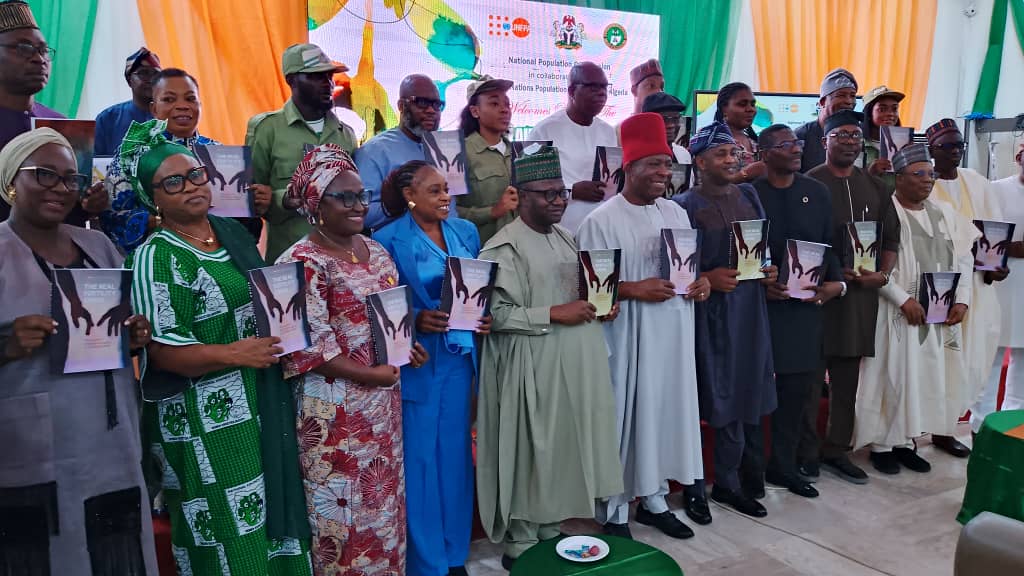News
NPC Calls for Shift from Fertility Focus to Addressing Structural Inequalities

By Joel Ajayi
The Chairman of the National Population Commission (NPC), Hon. Nasir Isa Kwarra, has called for a major shift in Nigeria’s population policy—from merely focusing on fertility rates to tackling the structural inequalities that shape reproductive choices.
Kwarra made this call on Tuesday in Abuja during the official launch of the 2025 State of the World Population (SWOP) Report, presented in collaboration with the United Nations Population Fund (UNFPA).
Delivering his address at the event, themed “The Real Fertility Crisis: The Pursuit of Reproductive Health Agency,” Kwarra noted that the report presents more than just global statistics—it serves as a wake-up call to reflect deeply on human development and the lived realities behind demographic figures.
“Fertility is often discussed in numbers—how many children are born, how fast populations are growing. But behind each number is a story: a woman, a family, a future,” he said. “The real crisis is not just about whether people are having more or fewer children, but about their ability to make those decisions freely and safely.”
He emphasized that millions of Nigerian men and women continue to face barriers—ranging from poverty, poor healthcare access, and gender inequality to inadequate data—that prevent them from exercising reproductive autonomy.
Highlighting key findings from the 2023–2024 Nigeria Demographic and Health Survey (NDHS), Kwarra revealed that Nigeria’s national Total Fertility Rate (TFR) has declined from 5.3 to 4.8 children per woman. Despite this progress, adolescent fertility remains a major concern, with 15% of girls aged 15 to 19 already pregnant or having begun childbearing.
The modern contraceptive prevalence rate among married women has risen slightly to 15%, still well below the national target of 27% by 2030.
Meanwhile, the unmet need for family planning has increased to 21%, underscoring major gaps in both service delivery and access.
“These figures are not just statistics,” Kwarra said. “They represent the reality of young girls forced into early motherhood, of women unable to space or limit pregnancies, and of families trying to make choices without adequate support.”
He added that the problem is not unique to Nigeria. Globally, fears of population decline are growing, yet millions still cannot have the number of children they want—when and how they want—due to structural and systemic barriers.
The NPC boss reiterated the critical role of accurate data in addressing these issues. He reaffirmed the Commission’s commitment to producing credible, inclusive data—especially through the upcoming National Population and Housing Census—to inform people-centered, rights-based policies.
“The shift we seek must move away from population control toward reproductive empowerment. From top-down policymaking to bottom-up agency. From fear-based messaging to policies that affirm dignity and freedom,” he said.
Kwarra stressed that this transformation is not just about upholding human rights—it’s also a smart development strategy.
“When individuals can make informed decisions about their reproductive lives, they are more likely to invest in education, health, and their communities. Empowered choices lead to empowered societies.”
He urged all stakeholders—government agencies, development partners, civil society, faith-based organizations, the private sector, and the media—to work together to remove the barriers hindering reproductive autonomy.
“As we reflect on the findings of this report, let us commit to building a Nigeria where every woman and man, every girl and boy, has the freedom and means to shape their reproductive journey—free from coercion, discrimination, or fear,” Kwarra concluded.
The SWOP 2025 report ultimately underscores a growing global consensus: that investing in reproductive rights and health is not only a matter of justice, but a vital step toward sustainable national development.
In his addressed the Chairman, Senate Committee on Population, Sen. Victor Umeh, cautioned against legislative attempts to control births, saying education should be the focus instead.
“Some countries, like China, have tried this and it is not helping them much,” he said.
He called for sex education for girls, to help them understand their reproductive cycles and take control of their fertility.
On the postponed National Population and Housing Census, Umeh said accurate population data was critical to national planning.
He said President Bola Tinubu had constituted a Presidential Committee to ensure a credible census is conducted soon.
He also assured that the National Assembly would give full support for the exercise.
News
Amb Lion Ogorry Files Landmark Lawsuit Against Sahara Reporters, Sowore For Misleading and Malicious Publication Endangering National Security

Ambassador Adebayo Lion Ogorry, a renowned public advocacy practitioner and activist, today announced the filing of a high-profile lawsuit against Sahara Reporters Ltd. and its publisher, Omoyele Sowore, in the High Court of the Federal Capital Territory, Abuja.
The suit, numbered FCT/HC/CV/4767/2025, accuses the defendants of publishing a false, malicious, and reckless article that violates Nigeria’s Constitution, the Cybercrimes (Prohibition, Prevention, Etc.) Act 2015, and other laws protecting public discourse, national security, and public order.
The originating summons, filed on November 24, 2025, stems from a Sahara Reporters article titled
“EXCLUSIVE: How Tinubu’s Defence Minister Matawalle Maintains Contact With Bandit Leaders, Ordered Them To Compel Communities To Vote For APC—Former Aide,” published on November 19, 2025.
Ambassador Ogorry alleges that the publication contains grave, unfounded accusations against the Honourable Minister of State for Defence, Dr. Bello Matawalle, claiming he maintains illicit contacts with bandit leaders, orders communities to vote for the All Progressives Congress (APC), and engages in activities that undermine counter-terrorism efforts.
These claims, according to the suit, are not only false but also fabricated to incite alarm, hatred, and ill-will, while endangering national security and public safety.
In his affidavit supporting the summons, Ambassador Ogorry, a Nigerian citizen and resident of Abuja with a long-standing commitment to public order and lawful civic discourse, emphasized that the article was disseminated widely across Sahara Reporters’ website, social media channels, X.com (Twitter) account, Facebook pages, WhatsApp broadcasts, and other platforms. He described the publication as a blatant violation of Section 39(3)(a) of the 1999 Constitution (as amended), which prohibits speech that endangers public safety, national security, and public order. Furthermore, it contravenes Sections 24(1)(a) & (b) of the Cybercrimes Act 2015 by disseminating false, misleading, and harmful information capable of causing alarm or ill-will.
“The defendants’ reckless actions have not only tarnished the reputation of a dedicated public servant but have also compromised ongoing military operations against banditry and terrorism in Nigeria’s North-West region,” said Ambassador Ogorry. “This publication promotes distrust, exposes the Minister to risks, and undermines the morale of our armed forces engaged in counter-terrorism. It is a direct assault on our national security and the freedom of expression that must be balanced with responsibility.”
The lawsuit seeks the following reliefs from the court:
– A declaration that the publication is false, misleading, malicious, and not protected speech under Section 39(1) of the Constitution (as amended).
– A declaration that it falls within restricted speech under Section 39(3)(a), endangering public safety, national security, and public order.
– A declaration that it violates Sections 24(1)(a) & (b) of the Cybercrimes Act 2015 by prohibiting false, harmful, or misleading information.
– AN ORDER OF INJUNCTION restraining the Defendants, their agents, or privies from further publishing, distributing, circulating, or causing to be circulated the said false publication or any other malicious publication especially as it relates to and against the person of Defence Minister, Dr. Matawalle.
– An order directing the defendants to issue a public retraction of the publication and publish a full apology on their website and social media channels for 14 consecutive days.
– General and exemplary damages of N10,000,000,000 (Ten Billion Naira) for the frivolous, false, and malicious publication geared toward endangering public safety, national security, and public order.
Ambassador Ogorry highlighted that the article, based on unverified claims from an alleged “former senior aide,” lacks any official record or evidence, demonstrating the defendants’ disregard for truth and ethical journalism. He urged the court to address this as a matter of urgent national importance, citing precedents such as President F.R.N. v. ISA (2017) and Guardian Newspapers v. AIEH (2011), which affirm that freedom of expression does not protect reckless publications that threaten security.
“This lawsuit is not just about correcting a falsehood; it’s about safeguarding Nigeria’s democracy, protecting public officials from baseless attacks, and ensuring media accountability,” Ambassador Ogorry added. “Sahara Reporters and Omoyele Sowore must be held responsible for their role in spreading dangerous misinformation that could fuel terrorism and disrupt public order.”
The case is set for hearing in the Abuja Judicial Division, and Ambassador Ogorry expressed confidence in the judiciary’s ability to uphold justice and constitutional principles.
About Ambassador Adebayo Lion Ogorry
Ambassador Adebayo Lion Ogorry is a public advocacy practitioner, activist, and Nigerian citizen dedicated to promoting national security, public order, and lawful civic discourse. With a focus on protecting public discourse from malicious interference, he advocates for responsible journalism and governance.
-

 Featured6 years ago
Featured6 years agoLampard Names New Chelsea Manager
-

 Featured6 years ago
Featured6 years agoFG To Extends Lockdown In FCT, Lagos Ogun states For 7days
-

 Featured6 years ago
Featured6 years agoChildren Custody: Court Adjourns Mike Ezuruonye, Wife’s Case To April 7
-

 Featured6 years ago
Featured6 years agoNYSC Dismisses Report Of DG’s Plan To Islamize Benue Orientation Camp
-

 Featured4 years ago
Featured4 years agoTransfer Saga: How Mikel Obi Refused to compensate me After I Linked Him Worth $4m Deal In Kuwait SC – Okafor
-
Sports3 years ago
TINUBU LAMBAST DELE MOMODU
-

 News11 months ago
News11 months agoZulu to Super Eagles B team, President Tinubu is happy with you
-
Featured6 years ago
Board urges FG to establish one-stop rehabilitation centres in 6 geopolitical zones
